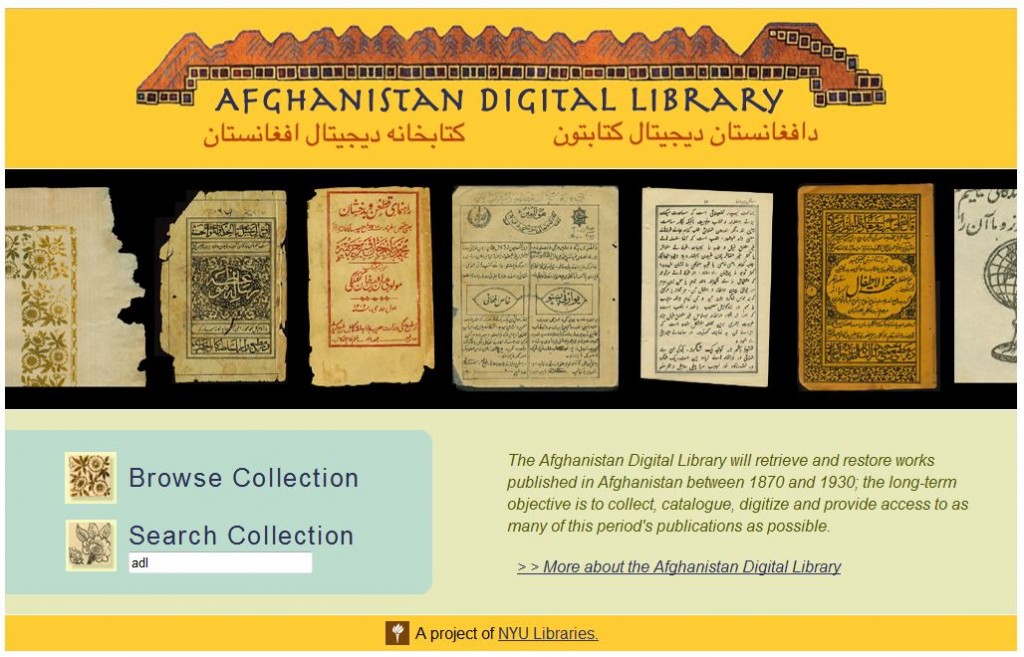Libraries are important cultural institutions that work to not only provide universal access to information and knowledge, but also preserve the cultural heritage and identity of the communities they serve. National libraries such as the United States’ Library of Congress or Spain’s Biblioteca Nacional de España work to achieve these objectives on a national scale.
Now, imagine the United States without the Library of Congress or the National Archives? What would happen to the Constitution? The Declaration of Independence? Or even the papers of our past Presidents? These materials are vital to understanding the values and tenants that shape our national past and future.
Unfortunately, the people of Afghanistan face this very issue. Decades of conflict have decimated the Kabul University Library, which also served as Afghanistan’s National Library.
An article written by Abdul Rasoul Rahin, a former director of the Kabul University Library, describes the once impressive holdings of the library. The Kabul University library held “200,000 books, 5,000 manuscripts, 10,000 books on Afghanistan Studies, 10,000 bound volumes of periodicals, 3,000 rare books, 10,000 electronic materials, 2,000 photo albums, 5,000 calligraphic specimens, and a strong collection of national archival and documentary materials.”[1] Like libraries all over the world the Kabul University Library worked to collect, preserve, and make accessible these valuable informational and cultural materials for the people of Afghanistan.
Sadly, the Afghanistan Civil War and other international conflicts have left the nation of Afghanistan in a state of turmoil since 1978. Since that time the materials of the Kabul University Library and other Afghani cultural institutions have been dispersed clandestinely over the black market or destroyed by fire and neglect. In the 1990s alone, “tens of thousands of books in both the Kabul Public Library and the Kabul University Library were destroyed under Taliban rule.”[2]
While conflicts continue to occur, positive efforts such as the Afghanistan Digital Library are working to both rebuild the libraries of Afghanistan and also preserve surviving Afghani collections and materials. A project of the New York University Libraries and supported by the National Endowment for the Humanities the Afghanistan Digital Library works with public institutions in Afghanistan and private collectors throughout the world in order to collect, catalog, digitize, and make available over the internet as many Afghan publications from the periods of 1871-1930, the earliest period of publishing in Afghanistan. Digitized materials will include rare books, historic photographs, newspapers, government documents, and journals.
In doing this the Afghanistan Digital Library will not only help in the process of “constructing a national bibliography for the country,” but also “reconstruct an essential part of Afghanistan’s cultural heritage.”[3] Most importantly however, the project will help bring the contents of Afghanistan’s history back into the hands of its people.
To visit and explore the Afghanistan Digital Library please click the link here.
[1] Rahin, Abdul Rasoul. “The Situation of Kabul University Library: Its Past and Present” World Libraries 8.2 (Spring 1998). Web. http://www.worlib.org/vol08no2/rahin_v8n2.shtml
[2] Lee, Felicia R. “Protecting an Endangered Afghan Species: Books.” New York Times 29 March 2003. Web. http://www.nytimes.com/2003/03/29/books/protecting-an-endangered-afghan-species-books.html?pagewanted=print
[3] “About the Afghanistan Digital Library.” Afghanistan Digital Library. n.d. Web. 22 October 2012. http://afghanistandl.nyu.edu/about.html


